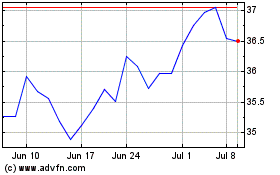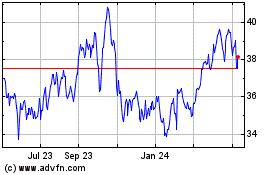By Selina Williams
LONDON--A weakened British pound caused by the U.K.'s vote to
leave the European Union has thrown a lifeline to a group of
businesses on the brink--small oil companies plying the North
Sea.
The fall of the British pound by nearly 14% since the June 23
referendum has lowered labor, equipment and engineering costs for
companies that have major operations in Scotland, the main base for
North-Sea outfits. These companies sell oil in dollars but pay
employees and the majority of their costs in the weakened British
currency.
Until now, they had been walloped by the slump in crude prices
and the declining productivity of aging fields offshore of Britain.
Now, they finally have something cheer about, even as the
uncertainty created by Britain's decision to leave the EU, known as
Brexit, has slammed other U.K. industries like travel companies and
banking.
"I don't really see any negatives, other than general market
uncertainty, " said Tony Durrant, the chief executive of Premier
Oil PLC, a London-based company that pumps about 60,000 barrels of
oil equivalent a day, mostly from the North Sea. "Our dollar income
is going to buy more and it's going to reduce our costs," he
added.
Oil giants like BP PLC and Royal Dutch Shell PLC, which have
large North Sea operations and big suites of London-based
executives and office workers, are also winners. Their share prices
have jumped to 14-month highs since the Brexit vote, after
declining along with oil prices for the past two years.
However, Shell--a company with more than 90,000 workers in over
70 countries--said the impact of a weaker pound is likely to be
relatively small. BP declined to comment.
Around 60% to 70% of spending on North Sea oil and gas is in
British pounds, says energy consultancy Wood Mackenzie. Last year,
companies invested over GBP11 billion ($14.6 billion) in North Sea
fields and were expected to spend around GBP10 billion this year,
according to trade association Oil & Gas U.K. estimates in
February.
Mr. Durrant said his company is saving $100 million on a new
North Sea oil-field development called Catcher because the pound's
decline has allowed it to budget for an exchange rate of $1.31
against the U.K. currency, instead of $1.60 per pound when the
project was planned two years ago. The project's overall cost has
been reduced by about 20% to $1.8 billion from $2.26 billion in
2014, partly because of lower contractor rates.
Further savings from the weak pound will come when oil begins to
flow next year, Mr. Durrant said.
Some British company share prices, which are denominated in
pounds while the value of their oil fields are in dollars, would
have received a boost from the exchange rate, said Tony Craven
Walker, CEO of Serica Energy PLC, whose London shares have risen
around 28% since the June 23 referendum.
"It's definitely been a short-term positive coming out of
Brexit," he said.
Until now, Premier and its rivals in the North Sea, like EnQuest
PLC and Ithaca Energy, had been blasted with a steady stream of bad
news. Investors punished their share price for their high debt
levels after oil prices began a steep descent in 2014, sending
Premier and EnQuest down 80% and Ithaca 60% lower. EnQuest declined
to comment. Ithaca was unavailable to comment.
The North Sea has long looked like a bad bet.
Earlier this year, when oil prices were trading around $30 a
barrel, nearly half the region's fields were operating at a loss,
according to Oil & Gas U.K. Britain's remaining offshore
barrels lie deep underwater in tough-to-drill reservoirs and some
infrastructure is old requiring constant maintenance and repair.
Total costs, including finding, developing, operating and
decommissioning, are around $50 a barrel--among the highest in the
world, despite efforts at cost control, according to Oil & Gas
U.K.
Companies have to spend huge sums to drain the British North Sea
of its last drops of oil. Once one of the world's great petroleum
basins, churning out more than 2.7 million barrels of crude oil a
day at its height in the 1990s, production in the North Sea has
declined to around 900,000 barrels a day in 2015.
Now, the falling pound makes it cheaper for North Sea-focused
companies to pay back some of the debt they took to launch
expensive projects. Premier, for instance, has GBP250 million of
debt drawn in pounds, which will be cheaper to pay back now because
its dollar income is stronger.
Brexit, however, isn't all good news for the North Sea oil
industry. Volatility on financial markets could cause new bank
funding to dry up. There are also worries that Scotland, which
voted to stay in the EU, could split from the U.K. and put the
debt-laden Edinburgh government on the hook for billions of dollars
in liabilities to wind down old fields.
A lack of clarity over these costs in the past has slowed down
mergers and acquisitions in the region, analysts have said.
"Going forward, Brexit has created uncertainties in the market,"
said Aidan Heavey, chief executive of Tullow Oil PLC, an
Africa-focused company with some gas production in the North
Sea.
Write to Selina Williams at selina.williams@wsj.com
(END) Dow Jones Newswires
July 19, 2016 05:03 ET (09:03 GMT)
Copyright (c) 2016 Dow Jones & Company, Inc.
BP (NYSE:BP)
Historical Stock Chart
From Mar 2024 to Apr 2024

BP (NYSE:BP)
Historical Stock Chart
From Apr 2023 to Apr 2024
